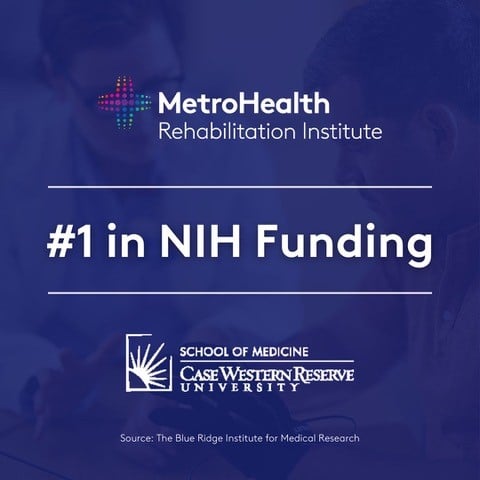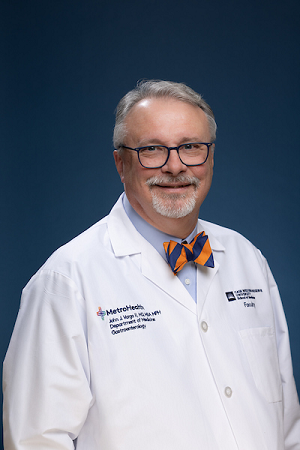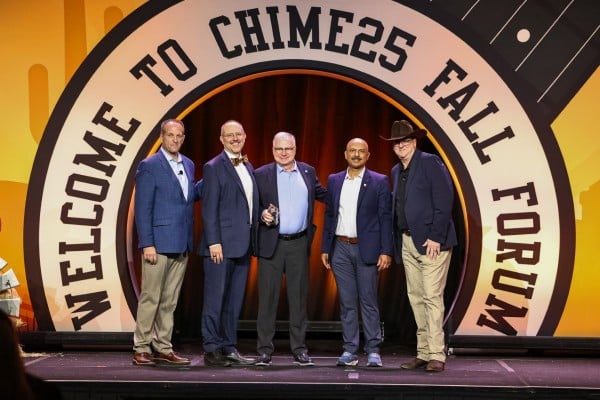Department of Physical Medicine and Rehabilitation Ranks No. 1 in NIH Funding
Published on 03/05/2025
 The Department of Physical Medicine and Rehabilitation (PM&R) at The MetroHealth System and Case Western Reserve University (CWRU) ranks No. 1 in the nation in National Institutes of Health (NIH) funding among PM&R departments in U.S. medical schools. The Blue Ridge Institute for Medical Research released the 2024 rankings based on NIH funding to individual researchers and academic institutions.
The Department of Physical Medicine and Rehabilitation (PM&R) at The MetroHealth System and Case Western Reserve University (CWRU) ranks No. 1 in the nation in National Institutes of Health (NIH) funding among PM&R departments in U.S. medical schools. The Blue Ridge Institute for Medical Research released the 2024 rankings based on NIH funding to individual researchers and academic institutions.
The Department of PM&R at MetroHealth and CWRU is housed in the MetroHealth Rehabilitation Institute, which includes a state-of-the-art clinical, research and education space at MetroHealth's Old Brooklyn Medical Center. The Rehabilitation Institute works to restore function, societal participation and quality of life for people with significant neurological and musculoskeletal impairments and functional limitations.
This is the second time in three years the Department of PM&R earned the top spot. It has also placed in the top five for the past several years.
The Rehabilitation Institute encompasses the clinical operations of PM&R and the MetroHealth Center for Rehabilitation Research. In 2024, the Center for Rehabilitation Research secured nearly $14 million in new grants, including more than $3 million from the NIH. The Center now has over $90 million in extramural research funding (total value of active grants through the life of the grants, direct and indirect). These grants are vital to ensuring the continuation of innovative research, which is an essential part of advancing patient care.
"Our mission is to innovate, test and translate to clinical practice rehabilitation interventions that improve the lives of people who have suffered neurological and musculoskeletal injuries," said Jayme Knutson, PhD, Senior Staff Scientist in the Department of PM&R and Center for Rehabilitation Research and Interim Co-Director of the Rehabilitation Institute. "The fact that our investigators are consistently awarded with significant NIH funding is a testament not only to the strength of our researchers' work but also its relevance. We are proud and grateful that NIH and other funders continue to recognize and reward our work."
Several research grants received in 2024 include:
- Ten separate one-year grants totaling $2.2 million from NIH to help researchers navigate the difficult and expensive regulatory process of making the Networked Neuroprosthesis (NNP) implant device available through open-source software. The NNP is an implantable functional electrical stimulation (FES) system that gives people with spinal cord injury (SCI) function of their paralyzed limbs and muscles. Kevin Kilgore, PhD, is the lead investigator.
- A $1 million Neuromod Prize from NIH to study the use of high-frequency spinal cord stimulation in reducing respiratory tract infections and improving bowel management in people with SCI. Tony DiMarco, MD, and Kris Kowalski, PhD, are the lead investigators.
- A $434,438 grant from NIH that will support a study that trains people with moderate to severe traumatic brain injury to work at a food and beverage kiosk at the Old Brooklyn campus. James Sulzer, PhD, is the lead investigator.
- Three grants totaling $1.3 million from the State of Ohio Third Frontier Research Grant Program to support putting into clinical practice a new way of assessing neurological function in people with SCI, $250,000 – Anne Bryden, PhD, is the lead investigator; the development of a FES hand grip system for people with SCI, $498,000 – Megan Moynahan, MS, is the lead investigator; and the development of robots to assist people with SCI, $500,000 – Eric Schearer, PhD, is the lead investigator.
- A $600,000 Lennon Foundation grant to commercialize an FES-driven hand grip system for people with cervical level SCI. Megan Moynahan, MS, is the lead investigator.
- A $697,000 grant from the Craig H. Neilsen Foundation to support training the PM&R Department's SCI Fellowship, which trains the next generation of physicians on treating people with SCI. James Wilson, DO, is the Director of the SCI Fellowship.
- A $600,000 grant from the National Institute on Disability, Independent Living, and Rehabilitation Research to develop a ride-on car therapy gaming platform for kids with cerebral palsy or traumatic brain injury. Michael Fu, PhD, and James Sulzer, PhD, are the lead investigators.
- Two grants totaling $5.8 million from the U.S. Department of Defense to support the development of a neuromodulation system for improving bladder function after SCI, $1.9 million – Dennis Bourbeau, PhD, is the lead investigator; and the development of an implanted FES system for enhancing walking independence after incomplete SCI, $3.9 million – Nathan Makowski, PhD, is the lead investigator.
- A $870,000 grant from the U.S. Department of Veterans Affairs to fund a clinical trial of technology for assistance with bowel management after SCI. Dennis Bourbeau, PhD, is the lead investigator.
Media Contact
Timothy Magaw
Director, System Communications
tmagaw@metrohealth.org
330-606-6241
About The MetroHealth System
Founded in 1837, MetroHealth is leading the way to a healthier you and a healthier community through service, teaching, discovery, and teamwork. Cuyahoga County’s public, safety-net hospital system, MetroHealth meets people where they are, providing care through five hospitals, four emergency departments and more than a dozen health centers. For more information, visit metrohealth.org.





